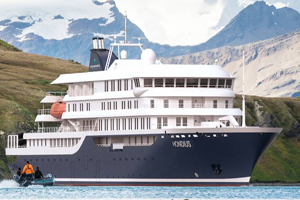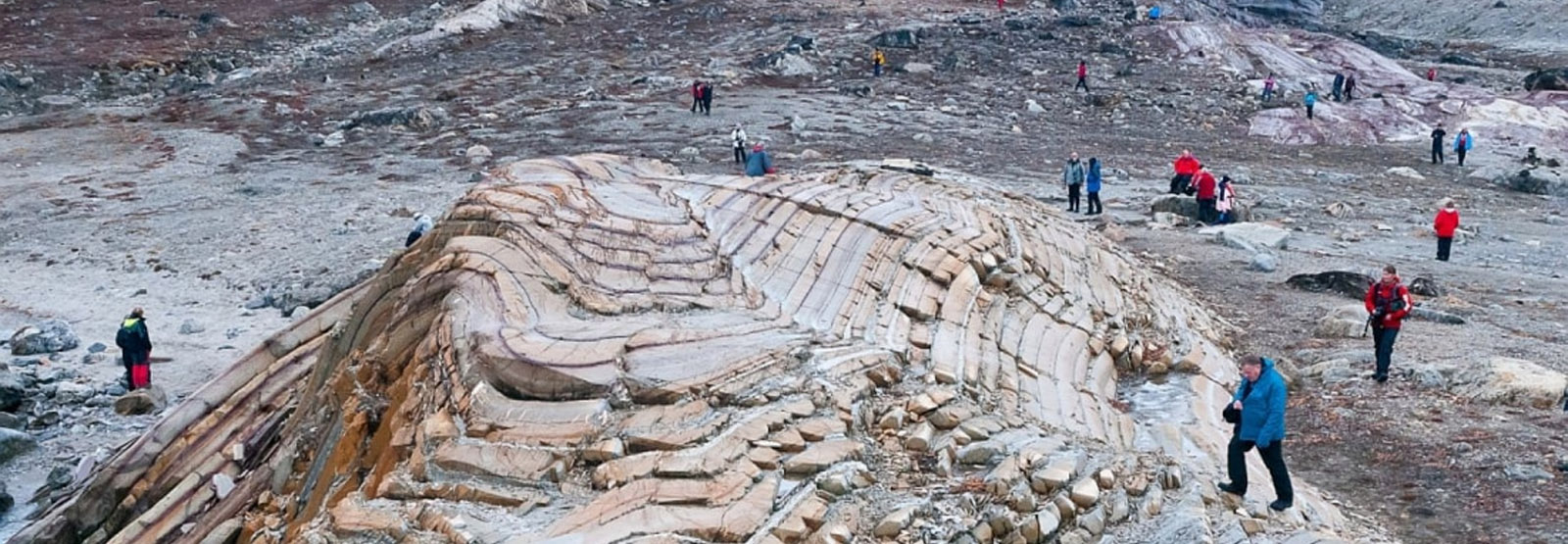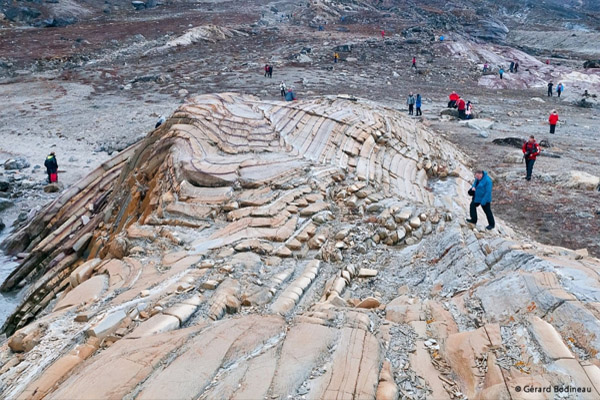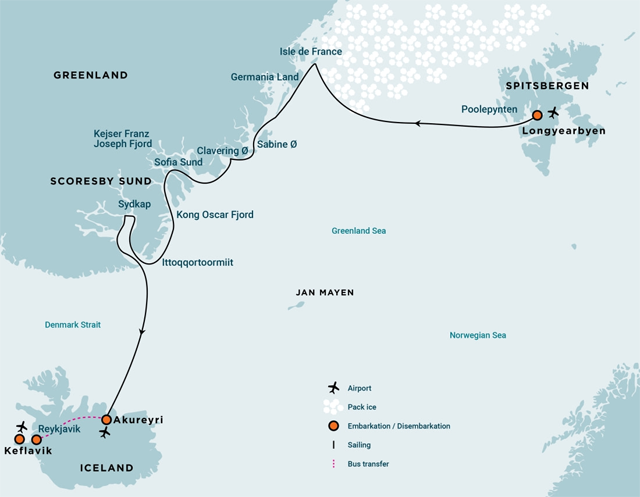DATES / RATES
Rates are listed per person in USD. Promotional offers are not reflected in the rates below.
|
| Start Date | End Date | Quadruple Porthole | Triple Porthole | Twin Porthole | Twin Window | Twin Deluxe | Superior | Junior Suite | Grand Suite with private balcony |
|---|
| Sep 06, 2026 | Sep 19, 2026 | 7,750 | 9,350 | 10,850 | 11,950 | 12,650 | 14,050 | 16,150 | 17,400 |
Rates are listed per person in USD. Promotional offers are not reflected in the rates below.
|
| Start Date | End Date | (Starting from)
Quadruple Porthole | (Mid-range)
Twin Deluxe | (High-end)
Grand Suite with private balcony |
|---|
| Sep 06, 2026 | Sep 19, 2026 | 7,750 | 12,650 | 17,400 |
ITINERARY
Day
1: Largest town, biggest island
You
touch down in Longyearbyen, the administrative center of Spitsbergen,
the largest island of the Svalbard archipelago. Enjoy strolling around
this former mining town, whose parish church and Svalbard Museum make
for fascinating attractions. In the early evening, the ship sails out
of Isfjorden, where you might spot the first minke whale of your voyage.
Day
2: At sea to Greenland
At
open sea, we sail toward Greenland and meet migrating seabirds and
whales. The waters here can sometimes be dramatic - the scent of
adventure is in the air!
Day
3: Among the sea ice
Sailing
westward, we see the jagged edge of the sea ice flashing ahead of us.
Keep watch for whales, migrating seabirds, and seals here. If you're
lucky, you may even spot a polar bear.
Day
4: Isle de France
If
ice and weather conditions are favorable, we land at Isle de France,
which was first reached by the Duke of Orleans on the Belgica in 1905.
We aim to go ashore at Kap St. Jacques, where, under the guidance of an
archeologist from the National Greenland Museum, we can see the remains
of the Independence II culture. If we don't make it to Isle de France,
we will spend a day on the ice or on the west coast of Germania Land,
an area with musk oxen and sometimes lonely, ranging wolves.
Day
5: Dove Bugt
When
sailing into Dove Bugt, we have landing possibilities at the south
coast of Germania Land, a mostly unglaciated area west of the
Danmarkshavn station. Alternatively we land at Store Koldewey, named by
the second German Polar Expedition of Koldewey 1869-'70, at Kap Ahrend
or Kap Alf Trolle.
Day
6: A historic past, a beautiful present
Sir
Edward Sabine performed his pendulum experiments on Sabine Ø
(formerly Inner Pendulum Island) in 1823. Koldewey built a station at
Germaniahavn. On its south side is Hvalros Island, where the population
of walruses is increasing again. From this date onward, sailing south,
we will experience darkness at night and have increasing opportunities
to see the Aurora Borealis.
Day
7: First and last Inuit
On
the south side of Clavering Ø, the English Explorer Douglas
Clavering met the local Inuit in 1823. It was the first and last time
Europeans met these people in Northeast Greenland, but the material
remains of their culture are frequently seen. We hope to make a landing
near Eskimonaes.
Day
8: Tundra, mountains, and icebergs
We
may sail into Foster Bugt and land at Margrethedal, where there are
remains of Thule culture from some centuries ago on the east side of
the river. Musk oxen populate the lower tundra areas near the shores.
From there, we sail through Sophia Sund, surrounded by mountain slopes
where musk oxen graze.
Day
9: Alpine landscapes
You
enter Segelsällskapets Fjord, with the banded slopes of the
Berzelius Mountains bordering the north side. You will land on the
south shore, where ancient sedimentary formations lie right at your
feet. A hike takes you close to a small lake with good chances to see
musk oxen, Arctic hares, and ptarmigans.
Alternatively,
you land in Blomsterdal (Flower Valley) near Antarctic Havn, where we
often spot groups of musk oxen. In the evening, we sail along the
strait between the island of Isikaja and the mainland. Until 30 years
ago, Isikaja was connected to the mainland by a glacier, but it has now
disappeared.
Day
10: Settlement Ittoqqortoormiit
The
morning stop is Ittoqqortoormiit, the only settlement in Scoresby Sund
at about four hundred inhabitants. At the post office, you can buy
stamps for your postcards or stroll around to see the sled dogs and
drying skins of seals and musk oxen.
If
time allows, you may land at a beautiful lagoon a few km west of Kap
Stewart, where migratory birds gather, and you will have an opportunity
for a stroll on the autumnal tundra of Jameson Land.
Day
11: Enormous icebergs & Arctic hares
In
the morning, you will likely encounter icebergs, some over 100 meters
high and a km long. Most of them are grounded as the fjord is only
about 400 meters deep. You then land near Sydkap, with fine views of
Hall Bredning and Arctic hares. Today's walk may go from Sydkap to
Nordöstbugt (12 km to the northeast), where the river coming
from Holger Danskes Briller flows into the sea. We can walk south along
the shore to Satakajik and see whale vertebrae in the construction of
the remains of Thule summer houses. Passengers who opt out of the long
walking group will join again at this location. In the evening, we will
sail south by Kap Brewster near the southern entrance of the fjord.
Day
12: Leaving from Earth's largest fjord
In
the early morning, we will sail by the east coast of Milne Land among a
multitude of giant icebergs. After a visit to the basalt columns and
ice formations of Vikingebugt, where we now and then have met polar
bears, you may also enjoy a Zodiac cruise past one of the glacier
fronts on the Volquart Boons Coast. In the early evening, we leave
Greenland, sailing south by Kap Brewster.
Day
13: Sea life beneath the Northern Lights
We
will sail southward in the cold East Greenland Current and later in the
warm Gulfstream Current with a multitude of sea life (whales, seals,
seabirds) at the mixing zones of these waters. A sea day grants you the
opportunity to spot whales and seabirds – and, at night, the
magical Northern Lights.
Day
14: At journey's end in Akureyri
You
disembark in Akureyri, where, on request, you can transfer by chartered
bus (a six-hour drive that you must book in advance) to the bus stop
Harpa Concert Hall and Conference Centre at Austurbakki,
Reykjavík.
Hondius (Expedition, 170-guests)
MV Hondius offers luxury accommodation for up to 180 passengers. The ship has a luxury standard while Oceanwide's signature cozy and informal atmosphere. Hondius the strongest ice-strengthened vessel will be in the polar regions and will be equipped with stabilizers, and great trips for advanced, innovative exploratory quality in the Arctic and Antarctic regions.
 (Click image to view Ship details)
(Click image to view Ship details)
WHAT'S INCLUDED
- Voyage aboard the indicated vessel as indicated in the
itinerary
- All meals throughout the voyage aboard the ship including
snacks, coffee and tea.
- All shore excursions and activities throughout the voyage
by Zodiac.
- Program of lectures by noted naturalists and leadership by
experienced expedition staff.
- Free use of rubber boots and snowshoes.
- Transfers
and baggage handling between the airport, hotels and ship only for
those passengers on the group flights to and from Longyearbyen.
- All miscellaneous service taxes and port charges throughout
the programme.
- AECO fees and governmental taxes.
- Comprehensive pre-departure material.
Excluded
from this voyage
- Any airfare, whether on scheduled or charter flights
- Pre- and post- land arrangements.
- Passport and visa expenses.
- Government arrival and departure taxes.
- Meals ashore.
- Baggage, cancellation and personal insurance (which is
strongly recommended).
- Excess baggage charges and all items of a personal nature
such as laundry, bar, beverage charges and telecommunication charges.
- The customary gratuity at the end of the voyages for
stewards and other service personnel aboard (guidelines will be
provided).




